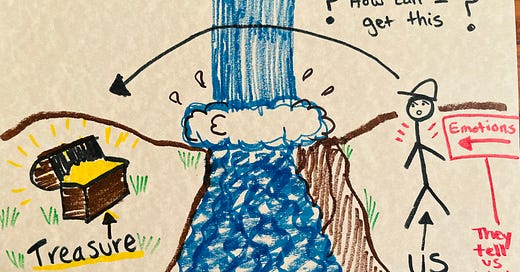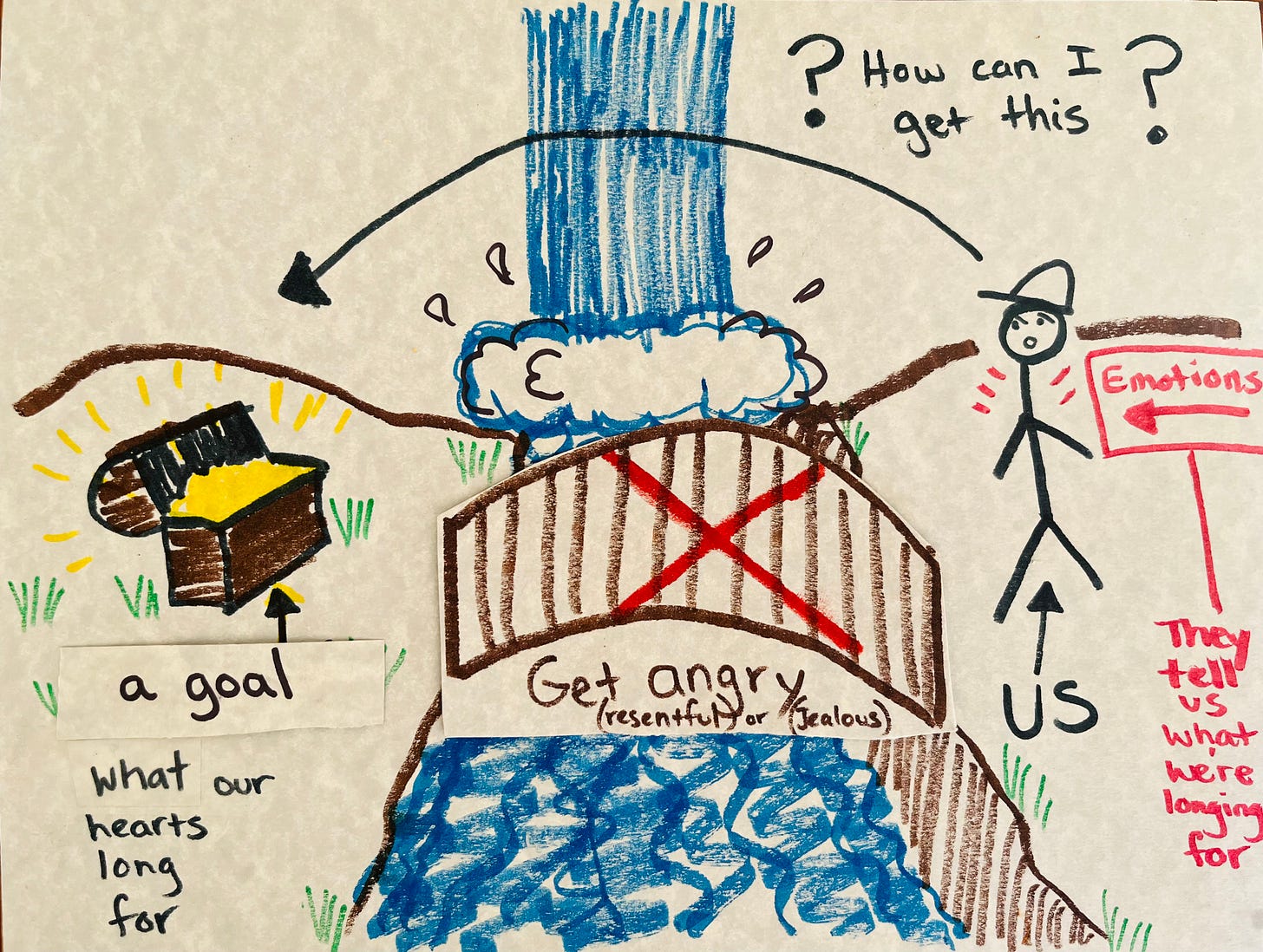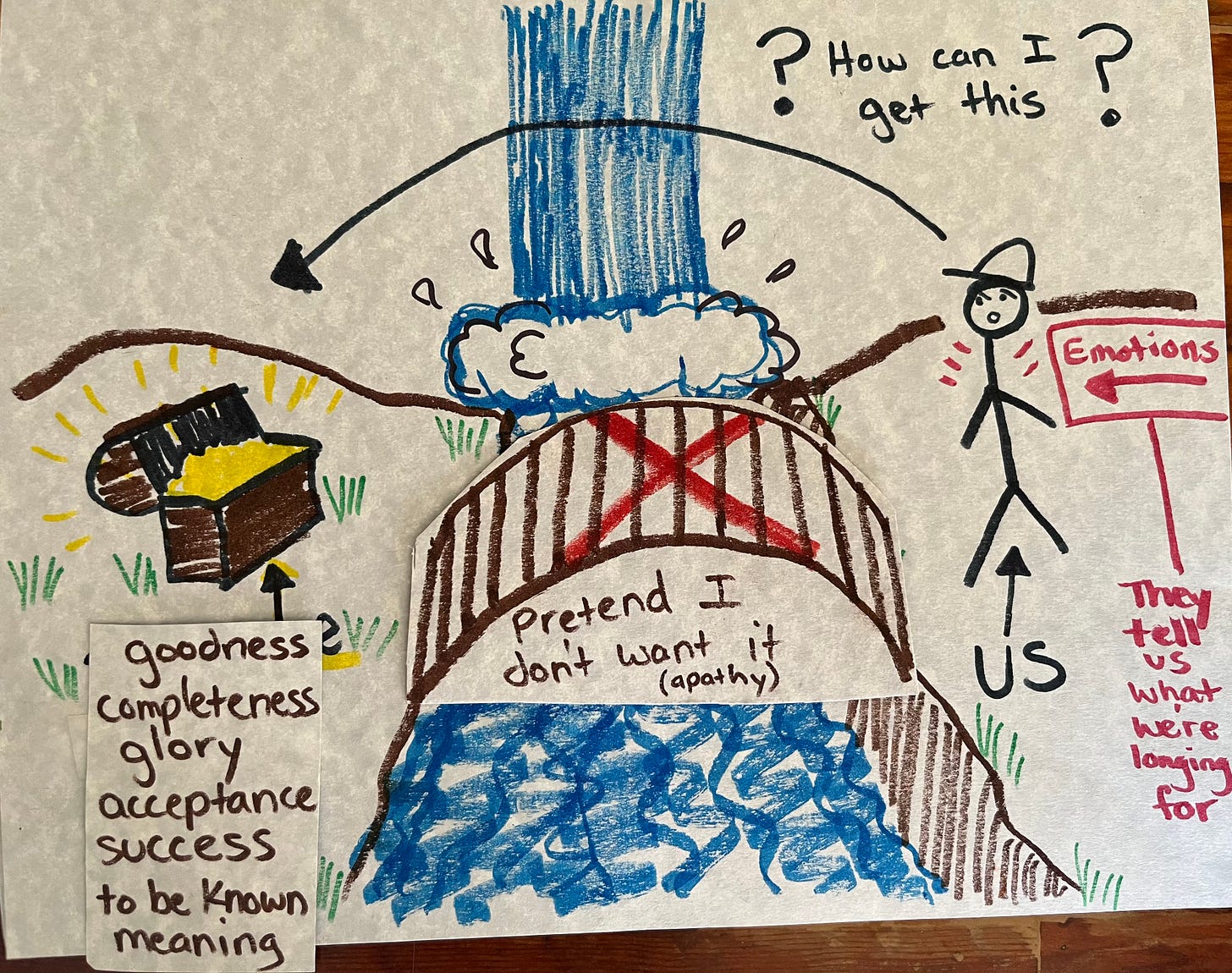The things we want in life are like treasures across a stream. Our treasure might be to buy a house, smooth out a turbulent relationship, learn Greek, or acquire a position at work. Our treasure may be to be a better Christian or help my children be better humans.
Our emotions serve as signposts indicating what we treasure. When afraid, something we treasure may be in danger. When we are angry, something we treasure may have been taken away. When we experience joy or pleasure, we may have obtained something we treasure.
The bridges across this river represent how we go after our treasures. We may use our God-given strengths, resources, or relationships to go after what we want. We may ask someone for help in obtaining what we want. We may pray or make plans to secure our treasure in the future.
If these methods don’t work, we may go after our treasures in unhealthy ways. We may steal it from others; my kids do this when they take more than their fair share. We may shame or guilt others into giving us what we want; “You’re selfish! You should give me some of what you have!” We may manipulate or force others into giving us what we want. We see this when governments use their citizens to satisfy their own needs.
Self-Deception Games
Now, we know it’s not OK to get what we want in unhealthy ways. It’s not okay to steal, shame, manipulate, pressure, or force others to give us our treasures. So if we’re trying to quiet our conscience and appear righteous, which often happens in Christian communities, we might disguise our treasures to justify our means. We might pretend that we don’t really want this goal of ours; rather, we just want to do God’s will. Or we might pretend that we don’t really want our heart’s desire; rather, we just want someone else’s good. If I can convince you that what I want is simply God’s plan for your life, then I may get my treasure and deceive myself into believing that I’m putting others before myself, a truly Christian trait.
For example, if my daughter saw me eating chocolate truffles, she may ask me to share. If I say no, she may beg and whine, or she may convince me that it’s for my best interest that I give her my truffles. “But Mama, you said you needed to cut back on sugar after New Year’s!”
If I tell her, “You’re right. I shouldn’t eat these truffles. I’ll give my truffles to Philip,” her emotions will be a signpost pointing to what she really desires. Did she actually want me to cut back on sugar? No, she wanted my truffles. In fact, if she’s clever, and I have a very clever daughter, she’ll next remind Philip of his health goals.
Or here’s another example: If something serious happened to one of my kids due to my poor parenting, say, I let one of them climb on the roof and he fell off, I may not want to tell my husband about it. I may try to fix it alone and pass it off like it’s no big deal. To avoid the shame of my mistake, I might convince myself that it’s best not to tell my husband about it. I might even convince myself that it’s out of love for my husband that I keep this information from him. I don’t want to trouble him. He seems tired. The day-to-day childcare is my responsibility, not his. It’s for his own good that I don’t tell him.
The question is, is it really in his best interest to exclude him from this or is it in my best interest? Am I motivated by his good or my good? Is this the Lord guiding me to hold my tongue or my own fear?
Here’s a final example that hits close to home. As of now, I don’t think there’s a Biblical foundation for excluding women from church leadership, but I realize not everyone agrees with this. Now, if I were going to try to change people’s minds through arguing—which let me tell you is very tempting, but also…since when does arguing change anyone?—, I might need to justify my strategy with some made-up pure motives. I might need to convince myself that I was only pressing the matter out of love for my fellow sisters whose authority is valued less than men’s. I might convince myself that I occupied some kind of moral high ground justifying my dragging people into arguments, or I might convince myself that I was motivated out of love for men who needlessly bear the burden of church leadership alone.
“I don’t do any of this for myself, only for the good of others…” Ha! Newsflash, I am not in any way this unselfish.
Take A Test
So how can we know if we’re playing these mind games? How can we tell if we’re deceiving ourselves about our intentions? I think the Lord has to reveal it to us. I don’t think we can even know our own hearts without daily surrendering to the Lord. And when He reveals that to us, you can bet it’ll involve a death to self. If we’re willing to take up our crosses and follow Him, He will show us both the darkness of our hearts and how he fills us with His light. While waiting on Him, here are a few questions to ask.
Is this really what’s best for these people? Am I sure this is what God has in store for them? Am I assuming I know what’s best for them? Do I believe that I have the moral high ground here?
Do I want this person’s good or do I want this particular method?
Do I have to use this [method] to obtain this [stated goal]?
Are there other ways to obtain this [goal] that don’t involve [these unhealthy methods]? Might God be calling me to do those things instead?
Thwarted Desires Might Be Pathways to the Lord
This brings me to my next picture. This picture is about what we do with our desires when all our efforts—healthy or unhealthy—are thwarted.
When nothing gets us what we want, we may get angry or resentful. We may distract ourselves from our desires by going after a different treasure. We may try to get rid of our desires and grow apathetic. We may stuff our desires and pretend we don’t want what we really want.
When we bottle up our desires, deceive ourselves, or pretend we don’t want what we really want, we miss out on an opportunity.
See, all our pursuits and longings are really a longing for the Lord. The desire to accomplish a goal may be linked to a desire for acceptance, success, or value. The desire for a healthy relationship may be linked to a desire to be known, understood, comforted, or taken care of. The longing to know more information may be rooted in a desire for God’s beauty, meaning, significance, understanding, or insight.
Earthly desires are God-given and good. God gave them to us to serve as the bridges to acquire more and more of His Heavenly treasure.
Where Is The Treasure
And here I need to alter my drawing in a significant way.
In truth, it’s not us who are seeking God’s heavenly treasure, but God who is seeking us through Christ. We are God’s precious treasure whom He loves, protects, and provides for. He has created a bridge to be with us. That bridge is Christ. Now God and all his Heavenly treasures aren’t across a river waiting for us. They are being given to us through our current circumstances as the Holy Spirit works in us and around us and through us.
My next picture falls short of depicting this since I couldn’t draw the treasure inside us. It’ll just have to be beside us in a treasure box for this illustration.
God’s Spirit now dwells in those who put their faith in Him. He offers us all the goodness, righteousness, power, value, and safety of Himself through every undesirable circumstance and unrealized earthly blessing, every painful relationship and ill-intentioned enemy.
With God as our treasure, we don’t have to fear that we’re not getting what we really want or that our treasure will be taken away from us or that we somehow won’t be able to obey what God has commanded of us. Every earthly loss, restriction, or mishap is an opportunity to acquire more of God’s courage, power, wisdom, value, and hope. Every unexpected circumstance is a place where we can be surprised to find God already working out His plans. Every ill-intended person is both a means by which venom may be siphoned from our hearts and an opportunity for us to siphon Christ to someone else.
We are rich indeed.
Follow-up Questions
What’s something you’ve tried to pursue but can’t seem to get?
What part of God’s goodness is behind this desire?
How can you realize God’s treasure in this circumstance?
What’s a method/bridge you’re in the habit of using to get something you want? How is the Lord involved in that bridge crossing?
To read more like this, click the links below:











Beautifully written!
Very good!!